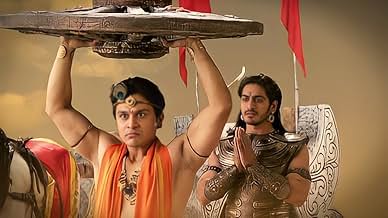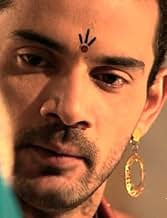Adicionar um enredo no seu idiomaAfter the Mahabharata war, Pandavas and Kauravas face Chitragupta's court to answer for their actions. Each episode features a character answering questions on behalf of others.After the Mahabharata war, Pandavas and Kauravas face Chitragupta's court to answer for their actions. Each episode features a character answering questions on behalf of others.After the Mahabharata war, Pandavas and Kauravas face Chitragupta's court to answer for their actions. Each episode features a character answering questions on behalf of others.
Explorar episódios
Avaliações em destaque
Dharma Kshetra, in Hindi (with English subtitles) is a brilliant adapatation of the Mahabharat. The events take place after the war after all the protagonists (except /Ashvattama) had died. It is set in the court of the divine arbiter Chitragupta.
One by one, the charcters of the epic; Bhishma, Drona, Vidura, Dhritarashtra, Sakuni, Dharmaraj, Bhim, Arjun, Nakul, Sahadev, Draupadi, Kunti, Gandhari, Duryodhan, Karn, Dushasan, Ashvattama and even Vedavyas are put in the dock to answer accusations levelled against them. The twenty-six episode serial ends with Bhagwan Shri Krishna himself explaining his actions, which some times looked dowright unethical.
No character in Mahabharat was perfect. Each one was a fallible being combating his or her personal demons and was a complex amalgam of nobility and meanness, forgiveness and vengefulness, love and rancor and sacrifice and greed.
The epic is a macrocosm of our own lives- layered with contradictions and conflicts. The writing and acting were uniformly good, occassionally even brilliant- Duryodhan and Karn were outstanding.
Dharma Kshetra is a tour-de-force, a really great small screen production.
It reinforced my belief that Mahabharat in sheer sweep and grandeur eclipses Homer's Iliad and Odysseus. I was also exposed to nuances in the epic, which I had not been aware off earlier.
One by one, the charcters of the epic; Bhishma, Drona, Vidura, Dhritarashtra, Sakuni, Dharmaraj, Bhim, Arjun, Nakul, Sahadev, Draupadi, Kunti, Gandhari, Duryodhan, Karn, Dushasan, Ashvattama and even Vedavyas are put in the dock to answer accusations levelled against them. The twenty-six episode serial ends with Bhagwan Shri Krishna himself explaining his actions, which some times looked dowright unethical.
No character in Mahabharat was perfect. Each one was a fallible being combating his or her personal demons and was a complex amalgam of nobility and meanness, forgiveness and vengefulness, love and rancor and sacrifice and greed.
The epic is a macrocosm of our own lives- layered with contradictions and conflicts. The writing and acting were uniformly good, occassionally even brilliant- Duryodhan and Karn were outstanding.
Dharma Kshetra is a tour-de-force, a really great small screen production.
It reinforced my belief that Mahabharat in sheer sweep and grandeur eclipses Homer's Iliad and Odysseus. I was also exposed to nuances in the epic, which I had not been aware off earlier.
Dharmakshetra Netflix series: I am glad I've accidentally came across this show on Netflix.
Though skipped it a couple of times thinking "why watch a mythological show that had been packaged many times by many", I am glad I took a chance to watch one episode and it just went on until I finished the whole series. Not disappointed at all.
Truly this is refreshingly different from the Mahabharat extravaganzas any of us had ever watched.
No extravagant ostentatious sets, No heavy makeup, No gaudy jewellery - not even those huge gems studded golden crowns. No vigorously imaginative artistic style. No exuberance what so ever at all. - Probably because the souls need none of these.
It just had one purgatory set and perhaps just one additional room which was altered for some flashback scenes of various key incidents.
Very simple clothes and easily understandable shuddh Hindi. The flashbacks and war scenes were to the point carefully crafted.
It's not a stereotyped linear narrative. It's a hybrid narrative which is non-linear, quest centric, view point oriented.
All episodes happen on a purgatory set where the main characters (both protagonists and antagonists) of Mahabharata blame, accuse with allegations, provide counter allegations which are further brainstormed in the court of Chitragupta (the Angel / Demi God who keeps records of the deeds of all human beings)
Each character was put on trial in the Dharmakshetra, the 'court of righteousness'. Everyone's inner mind and thoughts were exposed as they were allowed to openly and freely speak their mind and heart.
Every character has shades of grey and supporting reasons rather justifications. Each character is crafted in a way that nothing beyond human emotions are reason for the great battle of Kurukshetra.
Good screenplay - In some episodes it appears to be little stretched and repetitive but given that point of view (Why a particular individual character did what he or she did on earth) has to be explained in a plausible manner, it's worth that stretch.
Almost all the actors are from the small screen. Watching 'Crime Petrol' actors in the mythological characters was initially hilarious but because of the seriousness of the subject itself slowly I came out of that cynical mindset and appreciated each actor's effort. No doubt every actor proved their mettle.
Recommend this series for those who appreciate philosophical thought process, and logic seekers from the great text 'Mahabharata'.
Though skipped it a couple of times thinking "why watch a mythological show that had been packaged many times by many", I am glad I took a chance to watch one episode and it just went on until I finished the whole series. Not disappointed at all.
Truly this is refreshingly different from the Mahabharat extravaganzas any of us had ever watched.
No extravagant ostentatious sets, No heavy makeup, No gaudy jewellery - not even those huge gems studded golden crowns. No vigorously imaginative artistic style. No exuberance what so ever at all. - Probably because the souls need none of these.
It just had one purgatory set and perhaps just one additional room which was altered for some flashback scenes of various key incidents.
Very simple clothes and easily understandable shuddh Hindi. The flashbacks and war scenes were to the point carefully crafted.
It's not a stereotyped linear narrative. It's a hybrid narrative which is non-linear, quest centric, view point oriented.
All episodes happen on a purgatory set where the main characters (both protagonists and antagonists) of Mahabharata blame, accuse with allegations, provide counter allegations which are further brainstormed in the court of Chitragupta (the Angel / Demi God who keeps records of the deeds of all human beings)
Each character was put on trial in the Dharmakshetra, the 'court of righteousness'. Everyone's inner mind and thoughts were exposed as they were allowed to openly and freely speak their mind and heart.
Every character has shades of grey and supporting reasons rather justifications. Each character is crafted in a way that nothing beyond human emotions are reason for the great battle of Kurukshetra.
Good screenplay - In some episodes it appears to be little stretched and repetitive but given that point of view (Why a particular individual character did what he or she did on earth) has to be explained in a plausible manner, it's worth that stretch.
Almost all the actors are from the small screen. Watching 'Crime Petrol' actors in the mythological characters was initially hilarious but because of the seriousness of the subject itself slowly I came out of that cynical mindset and appreciated each actor's effort. No doubt every actor proved their mettle.
Recommend this series for those who appreciate philosophical thought process, and logic seekers from the great text 'Mahabharata'.
Growing up in India, it was hard not to watch and get influenced by the original Mahabharat series. While it was great, it never got too deep into explaining why certain actions were taken by the main characters and their backgrounds. This series fills the gap. It breathes a new life into the epic and takes it to the next level. I don't know anyone who has not liked this series. It's brilliance is in it's theme and writing. The actors are mostly good, Suyodhana/Duryodhana is the best of the lot and makes you think twice about the preconceived notions about his evil nature, and instead makes you feel bad for him. I can't think of another mythology being dissected and explained in a manner like this. This is a binge watch. Wish there was another season. The writers deserve an award.
The plot of this series is a courtroom drama between the characters when they meet in the afterlife. The content is engaging as all clever and cunning acts done by every major character of Mahabharath is discussed in the form of courtroom drama with Chitragupta being the judge. The series identifies the grey parts of the epic and gives better answers to the sinful acts committed by the characters (includes even Nakul, Sahadev, Dushashan, Vidur). Every episode is the allegations faced and justifications told by the characters and helps to view the epic from their point of view. One of the best and interesting adaptations of the Mahabharath Epic. A worthy watch on Netflix!!!
For all those who love analysing things from different perspectives , this series is a must. Kudos to the creators for doing such indepth research showcasing the critical thinking aspect of the Indian epics and culture..
Principais escolhas
Faça login para avaliar e ver a lista de recomendações personalizadas
- How many seasons does Dharmakshetra have?Fornecido pela Alexa
Detalhes
- Tempo de duração43 minutos
- Cor
Contribua para esta página
Sugerir uma alteração ou adicionar conteúdo ausente

Principal brecha
By what name was Dharmakshetra (2014) officially released in Canada in English?
Responda
![Assistir a Trailer Season 1 [OV]](https://m.media-amazon.com/images/M/MV5BZWFmY2M5YjMtZWEyOS00ZmE1LThjMDktMjU4YWRjODhlNjYyXkEyXkFqcGdeQXRyYW5zY29kZS13b3JrZmxvdw@@._V1_QL75_UX500_CR0)

























